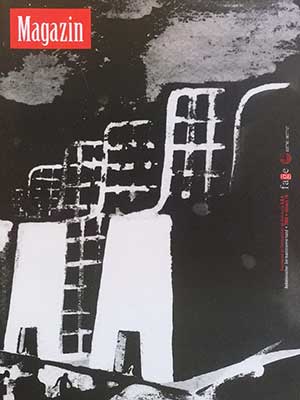La adquisición del parámetro del ascenso verbal en el alemán como tercera lengua
DOI:
https://doi.org/10.12795/mAGAzin.2008.i18.04Resumen
Sin resumenDescargas
Citas
A Commemorative Volume, Santiago de Compostela, Universidad de Santiago de Compostela, pp. 389-397.
(2004/2005), «La hipótesis de la transferencia de la L2 y la adquisición del orden de pala- bras», Revista Española de Lingüística Apli- cada, 17/18, 187-208.
(2005), El papel de la segunda lengua en la ad- quisición del orden de palabras del alemán como tercera lengua, Tesis doctoral, Univer- sidad del País Vasco/Euskal Herriko Unibert- sitatea, Vitoria-Gasteiz.
(2006), «Syntactic optionality in L2 grammars»,
Interlingüística, [en prensa].
Meisel, J. (1983), «Transfer as a second lan- guage strategy», Language and Communi- cation 3 (1), 11-46.
Meisel, J. (1997), «The acquisition of the syntax of negation in French and German: Con- trasting first and second language deve- lopment», Second Language Research, 13, 227-263.
Möhle, D. (1989), «Multilingual interaction in foreign language production», en H. W. Der- chert y M. Raupach, pp. 179-194.
Neuner, G. (1996), «Deutsch als zweite Fremds- prache nach Englisch. Überlegungen zur Di- daktik und Methodik und zur Lehrmateria- lentwicklung für die ‘Drittsprache Deutsch’», Deutsch als Fremdsprache, 4, 211-217.
Pica, T. (2002), «Subject-matter content: How does it assist the interactional and linguistic needs of classroom language learning?», The Modern Language Journal, 86 (1), 1-19.
Platzack, C. (1996), «The initial hypothesis of syntax: A Minimalist perspective on lan- guage acquisition and attrition», en H. Clahsen, Generative Perspectives on Lan- guage Acquisition, Amsterdam, John Ben- jamins, 396-414.
Prévost, P. y L. White. (2000), «Missing surfa- ce inflection or impairment in Second Lan- guage Acquisition? Evidence from tense and agreement», Second Language Research, 16, 2, 103-133.
Ringbom, H. (1983), «Borrowing and lexi- cal transfer», Applied Linguistics, 4 (3),
-12.
(1987), The Role of the First Language in Fo- reign Language Learning, Clevedon, Multi- lingual Matters.
Robertson, D. y A. Sorace. (1999), «Losing the V2 constraint», en E. C. Klein y G. Marto- hardjono, The Development of Second Lan- guage Grammars, Amsterdam, John Benja- mins, 317-367.
Schwartz, B. D. y R. Sprouse. (1994), «Word or- der and nominative case in nonnative langua- ge acquisition: A longitudinal study of (L1 Tur- kish) German Interlanguage», en T. Hoekstra y B. F. Schwartz, Language Acquisition Stu- dies in Generative Grammar, pp. 317-368.
(1996), «L2 cognitive states and the Full Transfer/Full Access Model», Second Lan- guage Research, 12, 40-72.
Sorace, A. (2000), «Syntactic optionality in non- native grammars», Second Language Rese- arch, 16 (2), 93-102.
(2003), «Near-nativeness», en C. J. Doughty y
M. L. Long, The Handbook of Second Lan- guage Acquisition, Oxford, Blackwell, pp. 130-151.
Spada, N. (1997), «Form-Focussed instruction and second language acquisition: A review of classroom and laboratory research», Lan- guage Teaching, 30, 73-87.
Stedje, A. (1976), «Interferenz von Mutterspra- che und Zweitsprache auf eine dritte Spra- che beim freien Sprechen-ein Vergleich», Zielsprache Deutsch, 1, 15-21.
Tsimpli, I. (1997), «Resumptive strategies and L2 acquisition: A minimalist account», en BUCLD 21 Proceedings, Somerville, Casca- dilla Press, pp. 639-655.
Vainikka, A. y M. Young-Scholten. (1994),
«Direct access to X-bar theory: Evidence from Korean and Turkish adults learning German», en T. Hoekstra y B. D. Schwartz, pp. 265-316.
(1996), «Gradual development of L2 phrase structure», Second Language Research, 12, 7-39.
Vildomec, V. (1963), Multilingualism, Leyden, Syhoff.
Vogel, T. (1992), «Englisch und Deutsch gibt es immer Krieg», Zielsprache Deutsch, 23 (2), 95-99.
Welge, P. K. (1987), «Deutsch nach Englisch.
Deutsch als dritte Sprache», en S. Ehlers y
G.L. Kardener, Regionale Aspekte des Grunds- tudiums Germanistik, München, Iudicium, pp. 189-225.
White, L. (1987), «Markedness and second lan- guage acquisition. The question of transfer.», Studies in Second Language Acquisition, 9, 261-285.
Zwart, J. W. (1997a), Dutch Syntax: A Mini- malist Approach,. Dordrecht, Kluwer.
(1997b), «The Germanic SOV languages and the Universal Base Hypothesis», en L. Hae- geman, The New Comparative Syntax, Har- low, Longman, pp. 246-267.
Descargas
Publicado
Cómo citar
Número
Sección
Licencia
Política de autoarchivo
Romeo Blue Journal (en preparación)
Solo se puede archivar el PDF de editor
El autor no puede archivar la versión pre-print
El autor no puede archivar la versión post-sprint
Condiciones generales
La revista se aloja en repositorios de acceso abierto
La revista se edita en formato impreso bajo demanda y para fines promocionales y de depósito legal en un porcentaje inferior al 5%
No prevé moving wall o período de embargo
Debe utilizarse la versión de editor/PDF
La fuente editorial debe reconocerse
Creative Commons Reconocimiento-NoComercial-SinObraDerivada 4.0 Internacional





